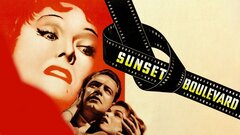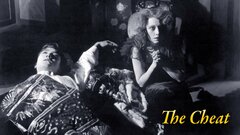Having emerged as a potent force during the birth of Hollywood, director Cecil B. DeMille was a crucial figure in the early development of the classic Hollywood narrative filmmaking style. Although less critically revered than D.W. Griffith, DeMille actually played a more important role in shaping the structure of the Hollywood system with films like "The Squaw Man" (1914), "Brewster's Millions" (1914) and "The Cheat" (1915).
The commercial success of "The Cheat" allowed DeMille to expand his creative scope to include the popular comedy "Don't Change Your Husband" (1919) and his first attempt at "The Ten Commandments" (1923). After leaving the silent era behind for the brave new world of talkies, DeMille embarked on a highly-profitable partnership with Paramount Pictures that enabled him to make his most memorable films.
Among the best was "Cleopatra" (1934), which harkened the penchant for grandeur and large-scale epics that became synonymous with his name. Following a string of lesser works like his first Technicolor venture, "Northwest Mounted Police" (1940), "Reap the Wild Wind" (1942), starring John Wayne, and the flag-waving drama "The Story of Dr. Wassell" (1944), DeMille made three of what many considered to be his finest films: "Samson and Delilah" (1949), "The Greatest Show on Earth" (1952) and his remake of "The Ten Commandments" (1956).
It was the latter film, with its cast of thousands and groundbreaking visual effects, that cemented DeMille's legacy as a true innovator who helped pioneer modern day epic filmmaking.
Born on Aug. 12, 1881 in Ashfield, MA, DeMille was raised in Washington, NC by his father, Henry, a former playwright turned dramatist, and his mother, Beatrice, who also shared a love of the theater. When DeMille was 11, his father died suddenly after developing typhoid fever, leaving his mother to raise three children on her own.
Ever resourceful, Beatrice used her home to open an acting workshop, the Henry C. DeMille School for Girls, and later became a successful Broadway promoter. Surrounded by the theater and the arts from birth, it was only natural for DeMille to follow in his parents' footsteps.
After graduating from Pennsylvania Military College at 15 years old, he studied acting at the American Academy of Dramatic Arts in New York City and soon made his professional debut in a production of "Hearts Are Trumps" (1900). DeMille moved on to become a member of the Standard Opera Company, with which he both directed and performed, while also acting for legendary theater producer David Belasco.
It was during this time that DeMille worked with several actors he later directed in some of his more famous movies, including Charlotte Walker and Mary Pickford. Meanwhile, he became the general manager of the DeMille Play Company, which was run by his mother, before making the transition to directing films in 1913.
DeMille entered filmmaking at the height of the silent era and made dozens of films during that time, including "The Squaw Man" (1914) - one of the earliest productions made by Paramount Pictures that he co-directed with Oscar Apfel - and the first of numerous film adaptations of the stage play "Brewster's Millions" (1914). Perhaps his most important picture at the time was "The Cheat" (1915), which, like D.W. Griffith's "The Birth of a Nation" (1915), was instrumental in developing the rules of classic Hollywood filmmaking.
The melodrama focused on an irresponsible society woman (Fannie Ward) who loses charity funds in the stock market, forcing her to borrow money from a wealthy Asian man (Sessue Hayakawa) in exchange for sexual favors. But when she finds another source for the money, the woman reneges on the deal, leading to violent retribution. Borrowing Belasco's pioneering stage lighting techniques, DeMille worked wonders with what could have been a hackneyed melodrama by giving it a unique visual style, featuring complex lighting and patterns of shadow suggestive of jail bars.
Characters were surrounded by smoke, silhouetted behind screens and appeared from nowhere amidst pitch black - a clear antecedent to later film noir. In DeMille's hands, "The Cheat" became an intricate study of individual responsibility, handled with subtlety and sophistication, which helped propel his career as one of early Hollywood's foremost directors.
With the commercial success of "The Cheat," DeMille was able to expand his output over the next eight or so years to make both comedies and dramas that managed to capture an American society in transition. DeMille's initial works brought famous plays and novels to the screen for Famous Players-Lasky (later, Paramount Pictures) - "Joan the Woman" (1917), an acclaimed retelling of Joan of Arc (Geraldine Farrar); the sophisticated romantic drama "Old Wives for New" (1918); and the satirical comedy of manners "Male and Female" (1919), starring Gloria Swanson.
He entered into the height of his silent career with the popular comedy "Don't Change Your Husband" (1919), starring Swanson and Elliott Dexter, before directing his first take on "The Ten Commandments" (1923). In this silent version, however, DeMille spent just the first half of his picture depicting the life of Moses (Theodore Roberts), while the second portion was set in the modern day and focused on two brothers (Richard Dix and Rod La Rocque) who make morally opposed decisions that lead to one's downfall and the other's salvation.
Budgeted at more than a million dollars, the film proved immensely profitable for Paramount. The film also marked one of the first times that DeMille used two-strip Technicolor for the Exodus part of the film, though over the years the color became badly faded and beyond restoration.
By the middle of the 1920s, a swaggering DeMille - who was already earning his reputation as a tyrannical director - rose up like the children of Abraham and forged his own exodus from the strict studio system, quitting Paramount in 1925 to set up his own studio. DeMille bought the old Thomas Ince Studios to form Cinema Corporation of America, which soon merged with Pathé-Cinéma.
Now on his own, DeMille directed what many considered to be his best film, "King of Kings" (1927), a $2 million rendering of the life of Christ (H.B. Warner), which again used the Technicolor process for the ending Resurrection sequence. But due to the company's lack of success with other films, DeMille was forced to return to the studio system and sign a contract with MGM in 1928.
Having tasted independence, the director clashed with the strictly controlling studio heads Louis B. Mayer and Nicholas M. Schenck. DeMille entered the Talkie era with the convoluted melodrama "Dynamite" (1929) before moving on to the truly bizarre and almost incomprehensible "Madam Satan" (1930). The director remade "The Squaw Man" (1931), which starred Warner Baxter and lost money upon its initial release.
Fed up with MGM, DeMille left in 1932 and returned to Paramount, where he stayed for the remainder of his career.
During the 1930s and 1940s, DeMille became Paramount Picture's most bankable director, turning out hits like "The Sign of the Cross" (1932), a religious epic about early Christianity during Roman times that starred Fredric March and Claudette Colbert. DeMille was at his best with historical costume epics like "Cleopatra" (1934), which was nominated for five Academy Awards and starred Colbert as the seductive queen of Egypt.
Meanwhile, DeMille directed and hosted a successful CBS radio show, "Lux Radio Theatre," from 1936 until 1945, when he refused to join the radio union and quit the program instead. He moved on to helm a number of successful films for Paramount, including the Gary Cooper Western "The Plainsman" (1937), the swashbuckling adventure "The Buccaneer" (1938), and another Western, "Union Pacific" (1939), starring Barbara Stanwyck and Joel McCrea.
With "Northwest Mounted Police" (1940), DeMille shot his first film in Technicolor, a Western that starred Gary Cooper as a Texas Ranger who joins the Canadian Mounted Police in an effort to quell a rebellion. He next directed "Reap the Wild Wind" (1942), which starred John Wayne as a 19th-century salvage ship captain contending with piracy off the Florida Keys and a romantic entanglement with the rescued employee (Paulette Goddard) of a rival company.
Under president Barney Balaban and studio boss Y. Frank Freeman, DeMille helped make Paramount Pictures the most profitable of the studios during Hollywood's Golden Age. DeMille focused on the recent past with "The Story of Dr. Wassell" (1944), which told the tale of Dr. Corydon M. Wassell (Gary Cooper), a medical missionary working in pre-World War II China, who disobeys orders to leave the island of Java during a Japanese bombing in order to tend to wounded soldiers.
Despite the built-in heroics of the main character, DeMille's take on the story lacked nuance in its straight-up Hollywood telling. He again reunited with Cooper for "Unconquered" (1947), an 18th-century-set adventure that depicted the violent struggles between American colonists and the Native Americans.
DeMille's dictatorial nature flared during production after co-star Paulette Goddard refused to participate in a scene that involved real flaming arrows, leading to the director refusing to ever work with the actress again. DeMille's career reached its apex for his next three films, starting with the biblical epic "Samson and Delilah" (1949), starring Victor Mature and Hedy Lamarr as the titular characters.
After becoming one of the biggest hits of the year, the film went on to earn five Academy Award nominations. Also that year, DeMille earned a Special Award from the Academy for 37 years of brilliant showmanship.
It was during the filming of "Samson and Delilah" that DeMille made his iconic cameo in "Sunset Boulevard" (1950), which starred Gloria Swanson as a delusional former silent film star who utters the iconic line, "All right, Mr. DeMille, I'm ready for my close-up." In the late '40s and early '50s, he became a leader of the Hollywood right wing in the anti-Communist witch hunt while directing two of his best - and last - films.
First was "The Greatest Show on Earth" (1952), a lavish showbiz drama set in the world of the Ringling Bros. and Barnum & Bailey Circus that centered on two rival trapeze artists (Betty Hutton and Cornel Wilde) vying for center ring. A large-scale film with dramatic action sequences - including a massive circus train wreck - "Greatest Show" was a critical and financial hit that took home two Academy Awards, including one for Best Picture.
DeMille saved his best for last with his spectacular remake of "The Ten Commandments" (1956), starring Charlton Heston as Moses and Yul Brynner as Pharaoh Rameses II. An epic four-hour dramatization of the Israelites' flight from Egypt that featured a cast of thousands, "The Ten Commandments" was a visual effects tour de force punctuated by the iconic parting of the Red Sea.
Despite numerous changes to the biblical account, the film nonetheless was a huge popular success for the director, earning seven Academy Award nominations and winning for Best Visual Effects.
Meanwhile, DeMille took a step back from filmmaking due to ill health, allowing son-in-law Anthony Quinn to direct the remake of his 1938 swashbuckler, "The Buccaneer" (1958), while serving as executive producer. DeMille was unhappy with the results and tried to salvage the film, but it was released to generally disappointing results. Having already suffered a heart attack while directing the Exodus sequence for "The Ten Commandments," DeMille succumbed to heart failure on Jan. 21, 1959.
He was 77 years old and had been planning on doing a science fiction movie set in space. In the final analysis, DeMille was remembered as a titan of Hollywood's Golden Age, though he was perhaps most instrumental during the silent era, when he was a key innovator of the classic narrative film - a form that would remain permanently dominant.
His legacy was cemented in the latter half of the 20th century by newer generations of filmmakers who capitalized on his influence - particularly those of Hollywood's second Golden Age in the 1970s - while his name was co-opted for the annual Cecil B. DeMille Award from the Hollywood Foreign Press/Golden Globes, which honored recipients for a lifetime of achievement in the film industry.









































































































